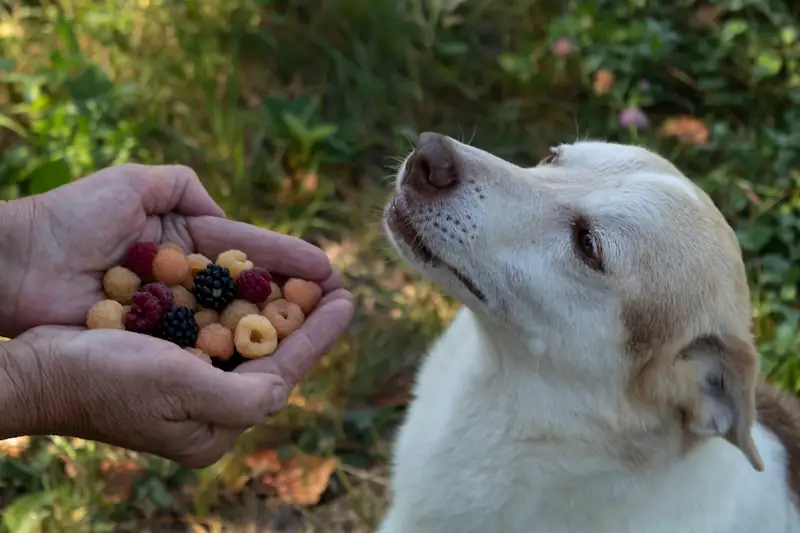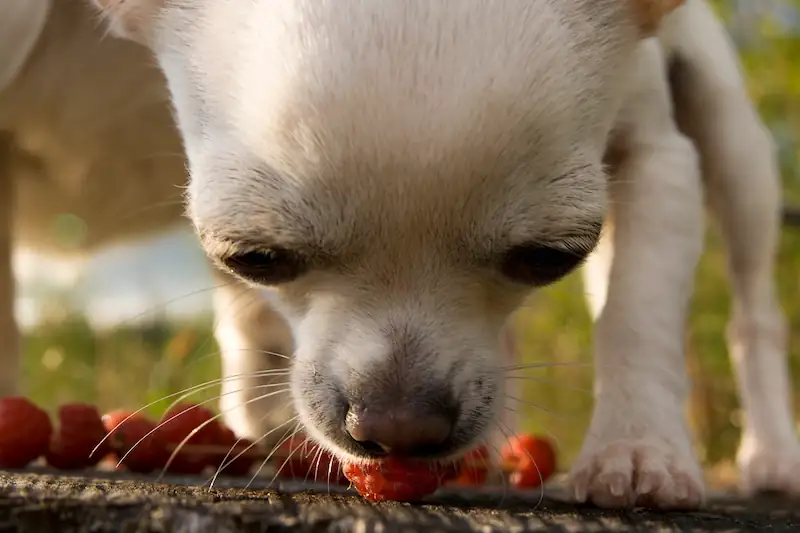Who doesn’t love berry season? So many delicious fruits to enjoy, like strawberries, blackberries, and of course, raspberries. Most of us love adding raspberries to our smoothies or morning oatmeal and appreciating the Vitamin C and fiber they add to our diet.
One common question that arises is, “Can dogs eat raspberries?” In this exploration, we delve into the nutritional aspects, potential benefits, and safety considerations of treating your canine companion to these delightful berries.
Can Dogs Eat Raspberries?

So, can dogs be given raspberries? The answer is yes, they can, but like everything else, they should be given in moderation. Raspberries contain antioxidants, which are good for dogs, especially older dogs because their anti-inflammatory properties help alleviate joint pain. But before you feed raspberries to your pet there are a few things to keep in mind.
Dogs don’t necessarily need to eat fruit for nutritional purposes, but raspberries do offer many health benefits, such as –
- They’re high in dietary fiber which fights obesity by keeping your dog feeling full, and they help improve a dog’s digestive system.
- They contain powerful antioxidants that can reduce the likelihood of cancer, heart disease, arthritis, and diabetes.
- They contain minerals like manganese, folic acid, copper, potassium, iron, and magnesium.
- They contain Vitamin C, B-complex, and Vitamin K.
- They’re low in calories and sugar, with most of the calories coming from the sugar.
Related: CAN DOGS EAT LETTUCE?
What Are The Dangers of Feeding My Dog Raspberries?

It should be noted that raspberries contain a very high level of natural xylitol, which is an all-natural sweetener typically found in various fruits and vegetables.
Xylitol is safe for human consumption, but it can be toxic to dogs. It’s been known to contribute to the development of hypoglycemia and liver disease, both of which can become very serious if left untreated.
Other side effects may include diarrhea, vomiting, and constipation. Raspberries are not necessarily toxic to your dog, but they should only be fed in moderation.
To be on the safe side, keep the serving to less than a cup. If you should have raspberries in your garden just keep an eye on your pooch to ensure he’s not gobbling them up.
Related: CAN DOGS EAT PICKLES?
Interesting Facts About Dogs and Raspberries

- Dogs are omnivores, which means they can benefit from consuming a variety of different vegetables and fruits, just like humans. Raspberries are low in sugar and fat but high in fiber and vitamins. Give raspberries to your pet in moderation and they’ll be fine.
- Biologists have noted that wolves in the wild forage for different types of berries, and they enjoy them a lot. It’s not known why they eat berries – perhaps for nutrition or maybe just because they love the taste – but we know that domestic dogs also love different types of berries.
- The fiber contained in raspberries is ideal for dogs that are overweight; it keeps them feeling full for longer, and they contain very few calories. If you’re trying to reduce your dog’s weight, help by easing hunger pains with high-fiber low-calorie foods like raspberries. They’ll feel less hungry, love their sweet snack, and their body will slowly adjust to less food.
- Raspberries come in a range of colors, including golden, black, yellow, and purple, but it’s the red raspberry that’s the most common and well-known.
To many people (and dogs) raspberries are the sweetest and nicest of the berries. The Vitamin C contained within the berries is great at helping the body absorb iron and excellent for the immune system.
The antioxidants reduce the risks of arthritis, cancer, diabetes, and heart disease, while the manganese helps synthesize carbohydrates and protein to create energy.
Add these to the copper, B vitamins, magnesium, and folic acid, and you have a powerhouse of valuable nutrients.
Related: CAN DOGS EAT WATERMELON? EVERYTHING YOU NEED TO KNOW NOW
Moderation is Key
Whether you give your dog too much of their regular food or too many berries, their digestive system is going to revolt. Their stomach and intestines simply can’t handle excessive amounts of food. If your dog has too many berries they will end up with loose stools, or even diarrhea.
How much is enough? For larger dogs like retrievers and labs, six to ten berries are enough, while small to medium-sized dogs should have no more than three to six berries per day. It should be given as a treat or light snack when your dog is showing interest in what you’re eating. Give these treats instead of ice cream or other sugary treats – they’re much better for your pet.
Raspberries And Sugar
Another negative aspect of giving raspberries to your dog and why they should be given a limited number is that they contain sugar, which is not good for your pet. The sugar contained in berries is called fructose, which has a different structure from sucrose (the sugar we use in our homes). So, while fructose is more ‘natural’ it’s still not good for dogs.
Another important point is that the amount of sugar contained in modern fruits is far greater than the amount of sugar contained in the wild fruits that wolves (your dog’s ancestors) foraged for thirty thousand years ago.
Your dog’s digestive system is programmed to process fat and proteins, and while foods containing sugar may be a nice reward or treat, they shouldn’t be consumed by your dog on a regular basis.
what can puppies eat?
After weaning, puppies can eat high-quality puppy food with the nutrition their young bodies require. They need specialized food because they are growing so fast. Feeding requirements also vary between large-breed puppies and small and medium-breed puppies.
puppies have unique dietary needs that require careful consideration. By providing them with a balanced diet that includes high-quality protein, carbohydrates, fats, vitamins, and minerals, you can help ensure they grow into healthy adult dogs.
raspberryis raw food good for dogs?
When it comes to how healthy a raw dog food diet is, there’s a lot of debate between veterinarians, pet nutritionists, and dog owners. Those in favor of raw dog food claim that it offers a number of healthy benefits for dogs.
what foods are good for dogs
Ensuring your dog has a balanced and nutritious diet is crucial for their overall health and well-being. Just like humans, dogs require a variety of nutrients to thrive. In this article, we’ll explore the different types of foods that are beneficial for dogs.
Protein
Protein is essential for dogs as it helps build and repair tissues. High-quality protein sources for dogs include chicken, turkey, beef, and fish. These proteins are rich in amino acids, which are the building blocks of protein.
Carbohydrates
Carbohydrates provide dogs with energy. Healthy sources of carbohydrates for dogs include whole grains like brown rice and oats, as well as vegetables like sweet potatoes and peas. These carbohydrates are also a good source of fiber, which aids in digestion.
Fats
Fats are important for maintaining healthy skin and coat, as well as providing a concentrated source of energy. Sources of healthy fats for dogs include fish oil, flaxseed oil, and chicken fat.
Vitamins and Minerals
Vitamins and minerals play a crucial role in a dog’s overall health. Some key vitamins and minerals for dogs include vitamin E, vitamin D, calcium, and phosphorus. These nutrients can be found in a balanced diet or in supplements.
Fruits and Vegetables
Fruits and vegetables can provide dogs with essential vitamins, minerals, and antioxidants. Safe options for dogs include apples, carrots, and blueberries. However, some fruits and vegetables can be harmful to dogs, so it’s important to do your research.
Grains
Grains are a controversial topic in dog nutrition. While some dogs may benefit from a grain-free diet, others may thrive on a diet that includes grains. It’s important to consult with your veterinarian to determine the best diet for your dog.
Homemade vs. Commercial Dog Food
Both homemade and commercial dog foods can provide a balanced diet for your dog. Homemade dog food allows you to control the ingredients, but it’s important to ensure it’s balanced and meets your dog’s nutritional needs. Commercial dog foods are convenient and are often formulated to meet the nutritional needs of dogs.
Supplements
Some dogs may benefit from supplements, especially if they have specific health concerns. Common supplements for dogs include glucosamine for joint health and probiotics for digestive health. However, it’s important to consult with your veterinarian before giving your dog any supplements.
Can I Give My Dog Canned Raspberries?
Canned raspberries, or raspberries in jars like spreads and jam, contain way too much sugar for your pet. They also contain dangerous preservatives that can be toxic to your pet. Avoid giving canned raspberries or raspberries in any type of jam or spread to your dog.
How Do I Give Raspberries To My Dog?
A few raspberries given to your dog every now and then will not hurt your dog. Fresh or frozen makes no difference, but it is recommended that they not be fed to your dog at the same time as protein because protein digests slower than fruits. And again, don’t let your fur baby into your raspberry patch!
Are There Any Good Alternatives To Raspberries For Dogs
Yes, there are, and again, these should be given in moderation.
Try Cranberries, Blackberries, watermelon, and Pineapple. As I said earlier dogs should primarily stick to dog food.
Raspberry types and varieties
- raspberry shrub
- black cap raspberry
- wild black raspberry
- meeker raspberry
- arctic raspberry
- raspberry garden
dog wont eat food problem
What you can do to help when your dog won’t eat depends on what you and your vet identify as causing the problem.
If your dog’s loss of appetite is due to a medical condition, your veterinarian may recommend a prescription diet to meet your pet’s nutritional needs while the underlying condition is treated. Sometimes these diets aren’t particularly palatable, especially if your dog is used to regular treats or human food. If your dog is already sick, never starve him to eat the prescribed diet. Instead, talk to your vet about alternatives. In more severe cases, your veterinarian may prescribe appetite-stimulating medications, recommend administering liquid food with a syringe, or insert a feeding tube.
Conclusion
In conclusion, the question “Can dogs eat raspberries?” is met with a nuanced response. While raspberries can be a delightful and nutritious treat for many dogs, responsible ownership involves understanding individual needs and potential sensitivities.
FAQs: Can dogs eat raspberries?
Q: Can dogs eat raspberries every day?
A: While raspberries can be part of a varied diet, moderation is crucial. Daily consumption may not be necessary or suitable for every dog.
Q: Are there specific breeds that should avoid raspberries?
A: Generally, most breeds can enjoy raspberries, but individual sensitivities may vary. Consulting with a vet is recommended.
Q: What is the best way to serve raspberries to dogs?
A: Fresh or frozen raspberries with seeds removed are considered safe. Smashing or blending them into dog-friendly recipes is another option.
Q: How do I know if my dog is allergic to raspberries?
A: Watch for signs like itching, swelling, or digestive upset. If you suspect an allergy, consult with a vet promptly.
Q: Can senior dogs eat raspberries?
A: Yes, many senior dogs can enjoy raspberries, but again, individual considerations apply. Consulting with a vet ensures appropriateness for your senior canine companion.



